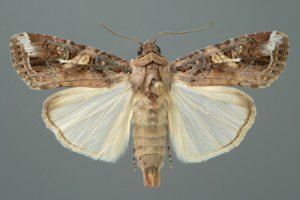
Typical adult male fall armyworm, Spodoptera frugiperda (J.E. Smith). Photograph by Lyle J. Buss, University of Florida.
FAO Global Action for Fall Armyworm Control extended to the end of 2023 with a broader scope
Rome: The spread of fall armyworm is driving intensified pesticide use, putting human and environmental health at risk. As recently as 2016, only six African countries reported the pest, which devours dozens of different crops. Today, 78 countries in Africa, the Near East, Asia and the Pacific are reporting it.
In Africa alone, fall armyworm is estimated to cause up to USD 9.4 billion in annual yield losses, according to QU Dongyu, Director-General of the Food and Agriculture Organization of the United Nations (FAO).
“Fall armyworm knows no boundaries and is continuing its rapid march across the globe,” QU told the Steering Committee of the FAO Global Action for Fall Armyworm Control today as it endorsed a move to extend its timeline to the end of 2023 and broaden its scope.
Also read: Fall armyworm: One of the most dangerous plant pests in the world
FAO launched the Global Action for Fall Armyworm Control (2019-2022) in December 2019 as an urgent response to the rapid spread of fall armyworm. It is now to extend its global drive against one of the world’s most invasive plant pests – fall armyworm – which is still destroying billions of dollars worth of crops despite progress and a raft of measures to tackle it, to the end of 2023.
The FAO Global Action for Fall Armyworm Control is coordinating comprehensive measures across Africa, the Near East and Asia.
- A functional coordination mechanism has been established across global, regional, national and farmer-field levels.
- Integrated Pest Management (IPM) tactics have been tested in eight geo-zones with good results.
- Maize hybrids tolerant to fall armyworms are now available from the International Wheat and Maize Improvement Center (CIMMYT) for testing and release in African countries.
- Training efforts, in collaboration with government partners, have reached over 140 000 participants, mostly farmers and agricultural outreach workers.
Reports on the impact of these measures are promising. In Burkina Faso, yield losses caused by fall armyworm are reported to be consistently at or below 5 per cent since 2020, and biopesticides and biological control have shown up to 90 per cent field efficacy against the pest.
Despite these achievements, there are still challenges to be addressed. The pest continues to spread, exposing new farmers and their livelihoods; large-scale gatherings and trainings are still being impeded by COVID-19; IPM adoption and yield loss reduction are uneven from country to country, and the use of hazardous pesticides persists.
In response, an extension of the timeline for the Global Action to the end of 2023 has been approved. FAO says the extension will enable increased dissemination of IPM technologies, and by increasing the Global Action’s scope, it will tackle multiple pest threats through sustainable plant health management, supporting the One Health Initiative.
Photo: Typical adult male fall armyworm by Lyle J. Buss, University of Florida.
– global bihari bureau




